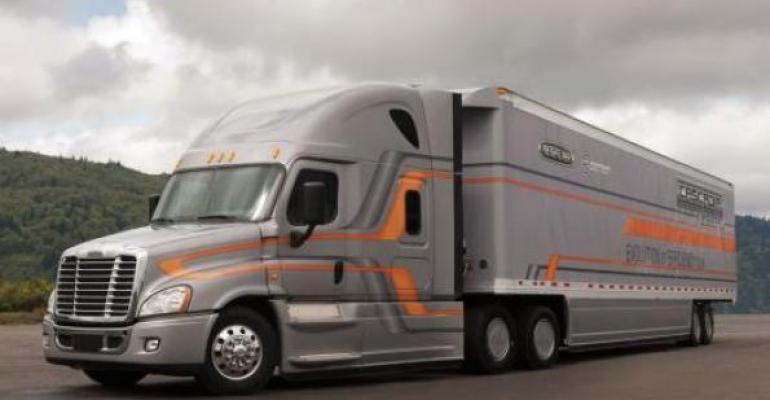Reacting to the Trump Admin.’s proposed import duties on steel and aluminum products, the European Union warns it is prepared to impose temporary safeguard duties on imports into the EU of U.S.-made trucks.
The EU executive, the European Commission, has released a draft list of products which may in the future attract retaliatory duties. This includes diesel or semi-diesel trucks weighing up to 5 tons and engine capacity of 2.5L or more, as well as motorcycles.
Auto-industry inputs on the list include a wide range of aluminum and steel products: bars, rods, angles, plate, wire and more. Also included are tempered and laminated safety glass for use in motor vehicles, plus rearview mirrors.
The Commission has released the list of products for consultation until March 26 on whether new tariffs would harm EU businesses as well as restrict U.S. exports. This process is continuing, despite the U.S. exempting the EU from the steel and aluminum duties until May 1 while talks on the issue continue.
EU Trade Commissioner Cecilia Malmström told the European Parliament March 22: “We are already pursuing our work on safeguards, because unfortunately the EU steel and aluminum industries have already been hit, because of the psychology of the market. And we are preparing the processes on rebalancing measures…that process is now ongoing with discussions with stakeholders and member states."
Having received comments, the Commission almost certainly will slim down its draft list before offering to hold 30 days of talks with the U.S. about its metal duties.
If these do not lead to an agreement – with the U.S., for example, reducing duties on other imported products to compensate the EU for the 25% steel duties and 10% aluminum duties (from which the U.S. has temporarily exempted Canada and Mexico), then the EU would increase duties charged on U.S. exports, with items – possibly trucks and vehicle inputs – chosen from its list.
Initially, this would involve scrapping special low or zero-duty market access that the U.S. enjoys in EU markets and this could happen within 90 days of the talks failing – this would probably cover automotive metal inputs and motorcycles.
Looking ahead, if this action did not achieve the desired effect of forcing the Trump administration to remove the metal duties or exempt the EU from them, this could be followed by new EU tariffs. The overall goal would be to raise the same amount of revenue as that raised by the U.S. from its new steel and aluminum duties.
Reaching agreement between Brussels and Washington will not be easy, however, because the EU thinks the U.S. duties are based on a sham legal authorization. The U.S. has acted on supposed national security grounds, arguing the tariffs will boost America’s metal industry and hence create a reliable domestic metal-production base to build up its military. World Trade Organization (WTO) rules allow countries to protect their economies under national security grounds.
The EU’s Malmström has said this justification for action does not hold water legally, because the EU would not stop exporting metal to the U.S. to starve its defense manufacturers of materials: “We cannot see how the EU, friends and allies in NATO, can be a threat to international security in the USA,” she has said.
As a result, the EC has concluded the metal duties are an “economic safeguard measure in disguise, not a national security measure,” which means the EU thinks it can “use the WTO safeguard agreement to rebalance benefits that we have given to the U.S. in the past,” Malmström has argued.
Usually safeguard duties are imposed on all imports of a product, whatever the exporting country. But one trade-policy expert explains that if the EU maintains the American duties are a disguised safeguard measure, then it can claim the right to impose compensatory duties on different products (not just metal), including trucks. Also, it can impose them on the U.S. alone, under article 8 of the WTO safeguard agreement.
*See http://trade.ec.europa.eu/doclib/docs/2018/march/tradoc_156650.pdf; https://www.wto.org/english/docs_e/legal_e/25-safeg_e.htm#8 and http://trade.ec.europa.eu/doclib/docs/2018/march/tradoc_156648.pdf





